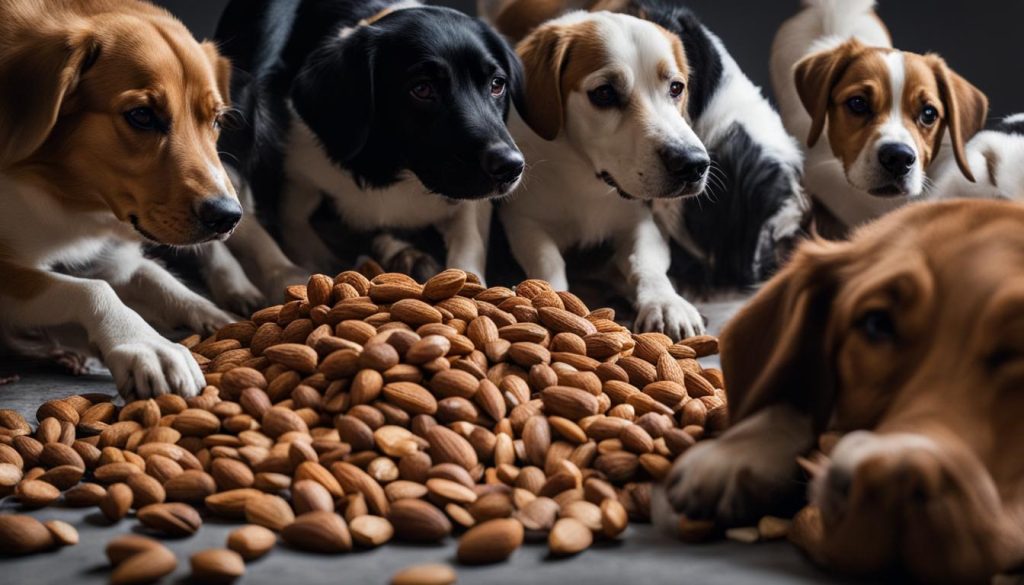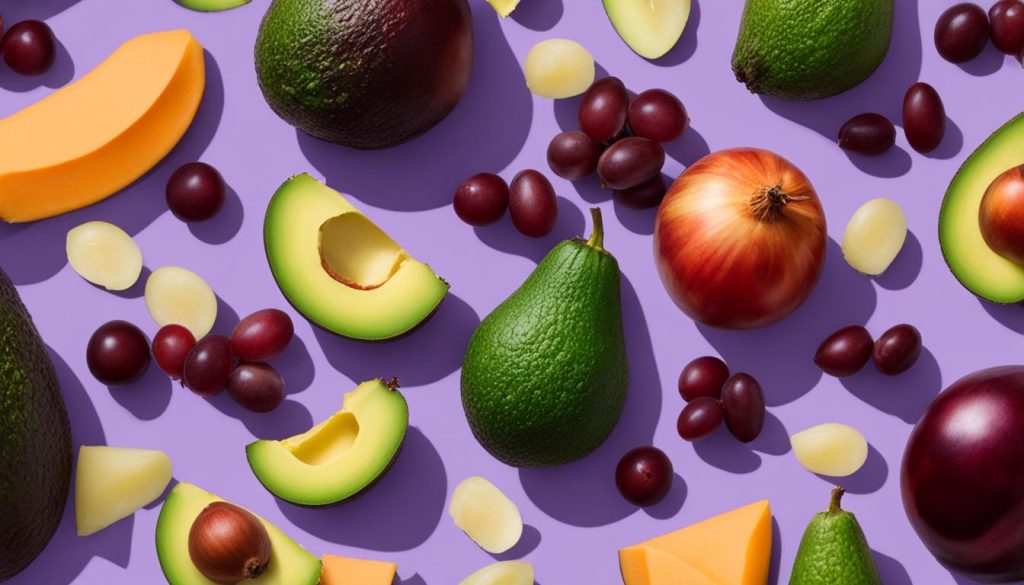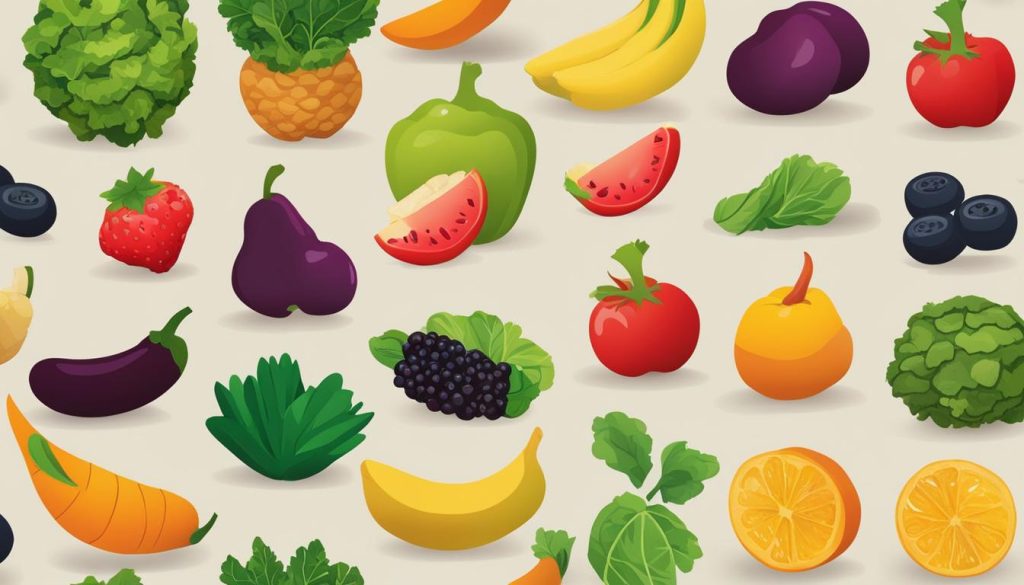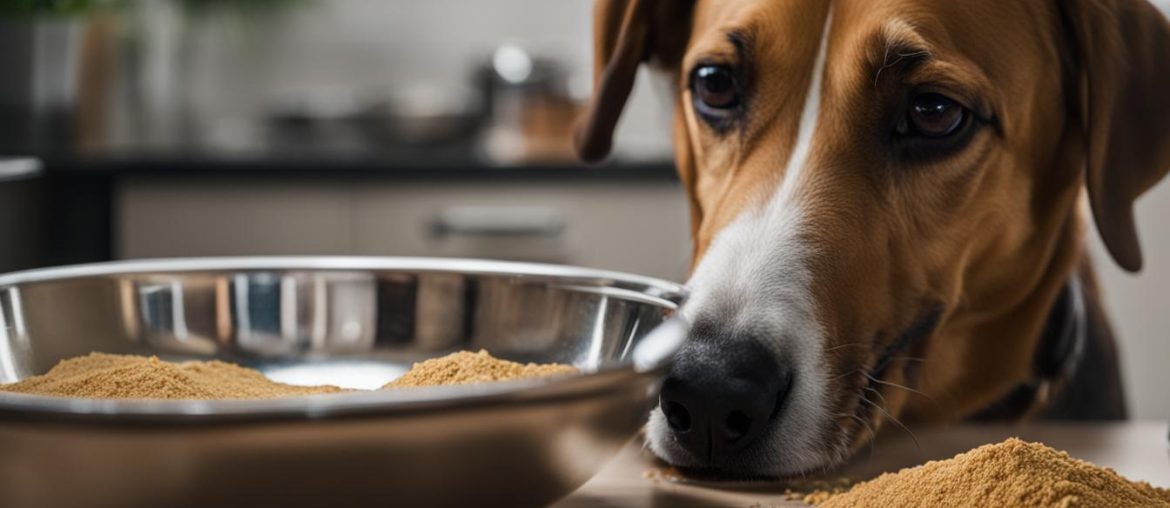Giving our furry friends a balanced and nutritious diet is crucial for their overall well-being. As responsible dog owners, it’s important to make informed choices about what we feed our dogs. One common question that arises is whether dogs can have almond flour.
Almond flour, derived from ground almonds, has gained popularity in human diets as a gluten-free alternative. However, when it comes to our canine companions, caution should be exercised when considering almond flour as a part of their diet.
While almonds themselves are not toxic to dogs, almond flour can pose potential health concerns. It’s essential to understand both the dangers and possible benefits before making any dietary decisions for our beloved pets.
Key Takeaways:
- Almond flour may pose potential health problems for dogs and should be avoided.
- Almonds can be a choking hazard and may cause gastrointestinal upset in dogs.
- Almond flour is often heavily salted, which can be dangerous for dogs, especially those with heart disease.
- Consulting with a veterinarian is recommended before introducing almond flour or any new food into a dog’s diet.
- Providing a balanced and appropriate diet is crucial for a dog’s health and well-being.
Almonds: Hazards for Dogs

Dogs should not be allowed to eat almonds. If swallowed whole, almonds can cause potentially life-threatening obstructions in the esophagus, stomach, or small intestine. They are difficult to digest and can lead to gastrointestinal upset, including vomiting and diarrhea. Almonds are also high in fats, which can trigger pancreatitis in some dogs. Furthermore, the salt content in almond products can be harmful to dogs, especially those with heart conditions.
It is important to prioritize the safety and well-being of our furry friends by understanding the potential risks associated with almonds and dogs. While almonds may be a popular snack for humans, they can pose significant hazards to our canine companions. Whether it’s the risk of obstructions, digestive upset, pancreatitis, or salt-related issues, it’s crucial to ensure that almonds are kept away from dogs.
If you suspect your dog has ingested almonds or is showing any signs of discomfort or illness after consuming almonds, it is best to seek veterinary care immediately. A professional evaluation and guidance can help address any potential complications and ensure the health and safety of your beloved pet.
Almond Butter and Dogs
While almond butter itself is not toxic to dogs, it is important to exercise caution when feeding it to your furry friend. Many almond butter brands on the market contain added ingredients that can be harmful to dogs, such as salt, sugar, or xylitol. These ingredients can have adverse effects on dogs’ health and should be avoided.
Before feeding your dog almond butter, it is crucial to carefully check the ingredient list to ensure it does not contain any harmful additives. Look for almond butter brands that use only natural ingredients and do not include any additives that could be detrimental to your dog’s health.
Additionally, it is important to note that almond butter is high in fat. While healthy fats are an essential part of a balanced diet for dogs, excessive fat intake can lead to weight gain and potentially pancreatitis, a condition characterized by inflammation of the pancreas. Therefore, almond butter should be given to dogs in moderation, as part of a well-rounded diet.
It’s important to remember that every dog is unique, and what may be safe for one dog may not be suitable for another. If you have any concerns about feeding almond butter to your dog or want specific dietary recommendations, consult with your veterinarian. They can provide personalized advice based on your dog’s individual needs and health status.
Almond Milk and Dogs

Can dogs drink almond milk? This is a common question among pet owners looking for alternative milk options for their furry companions. While small amounts of almond milk are generally safe for dogs to consume, it is important to be aware of the potential risks and drawbacks.
Almond milk is derived from almonds, which are high in fat. Feeding dogs excessive amounts of almond milk can lead to digestive upset, including diarrhea and vomiting. The high fat content can also contribute to weight gain and obesity, as well as increase the risk of pancreatitis, a painful and potentially life-threatening condition.
It is crucial to limit the amount of almond milk given to dogs and opt for water or dog-safe alternatives instead. Water is the best and safest option for keeping your dog hydrated, while specially formulated dog milk replacers can be used for puppies who are not yet weaned.
When considering giving almond milk to your dog, it is important to consult with your veterinarian. They can provide personalized advice based on your dog’s specific needs and health conditions. Your vet may recommend alternative milk options, such as goat milk, which may be more suitable for dogs.
Always prioritize your dog’s well-being and ensure they are receiving a balanced diet that meets their nutritional requirements. If you have any concerns about your dog’s diet or health, it is best to consult with a veterinary professional.
Almonds vs. Other Nuts for Dogs

When it comes to nuts for dogs, it’s important to be aware of which ones are safe and which ones can be dangerous. While almonds themselves are not toxic to dogs, there are other nuts that can pose a risk to their health. Let’s explore the comparison between almonds and other nuts commonly found in households:
Macadamia Nuts
Macadamia nuts are highly toxic to dogs, even in small amounts. If a dog ingests macadamia nuts, it can cause symptoms like vomiting, tremors, and increased body temperature. It’s vital to keep macadamia nuts out of your dog’s reach to prevent any accidental ingestion.
Walnuts and Pecans
While walnuts and pecans are not as toxic as macadamia nuts, they can still be harmful to dogs. These nuts can cause gastrointestinal issues, including stomach upset and blockages. It’s best to avoid feeding walnuts and pecans to your furry friend.
When it comes to the safety of nuts for dogs, it’s always recommended to consult with your veterinarian. They can provide personalized advice based on your dog’s specific dietary needs and health condition. Remember, each dog is unique, and what may be safe for one dog may not be the same for another.
Now that we understand the potential dangers of certain nuts for dogs, it’s crucial to prioritize their well-being by making informed choices about their nutrition.
What to Do if Your Dog Eats Almonds

If you suspect that your dog has eaten almonds, it is best to seek veterinary advice. In some cases, inducing vomiting may be necessary if the ingestion occurred within the last 30 minutes. However, if you are unsure of the timing or your dog is showing signs of distress, it is important to contact your veterinarian and closely monitor your dog for any signs of illness or discomfort.
| Symptoms to watch for: | What to do: |
|---|---|
| Vomiting | – Call your veterinarian for guidance |
| Diarrhea | – Monitor your dog closely for any worsening symptoms |
| Abdominal pain or discomfort | – Observe your dog’s behavior and report any changes to your veterinarian |
| Lethargy or weakness | – Keep your dog in a quiet, calm environment and contact your veterinarian |
| Loss of appetite | – Offer small, bland meals and consult with your veterinarian if the problem persists |
Other Foods to Avoid Feeding Dogs

When it comes to providing a safe and healthy diet for our canine companions, it’s important to remember that some foods can be toxic or harmful to dogs. Here are a few examples of foods that should be kept out of reach of dogs:
- Grapes and raisins: These fruits can cause kidney failure in dogs.
- Onions and garlic: These vegetables can damage a dog’s red blood cells and lead to anemia.
- Chocolate: Chocolate contains theobromine, which is toxic to dogs and can cause vomiting, diarrhea, and even heart problems.
- Coffee: Coffee, like chocolate, contains theobromine and should be avoided.
- Alcohol: Alcohol can be extremely harmful to dogs and can cause vomiting, diarrhea, difficulty breathing, and even death.
- Xylitol: This artificial sweetener is commonly found in sugar-free gum and candy and can lead to a rapid drop in blood sugar levels and liver failure in dogs.
These are just a few examples of foods that can pose a significant risk to your dog’s health. It’s important to educate yourself on what foods are safe and appropriate for dogs and to always keep potentially harmful foods out of their reach.
| Foods Toxic to Dogs | Dangerous Foods for Dogs |
|---|---|
| Grapes and raisins | Chocolate |
| Onions and garlic | Coffee |
| Alcohol | Xylitol |
Safe Foods for Dogs

When it comes to the well-being of our furry friends, providing them with safe and healthy foods is essential. While there are many foods that dogs should avoid, there are also plenty of options that are both delicious and nutritious for them. Let’s explore some of the dog-friendly foods that you can include in their diet:
Fruits:
Fruits can make a tasty and refreshing treat for dogs. Apples, bananas, and berries are safe choices that dogs can enjoy in moderation. However, remember to remove the apple seeds as they contain small amounts of cyanide, which can be harmful to dogs.
Vegetables:
Adding vegetables to your dog’s diet can provide them with essential vitamins and fiber. Carrots, green beans, and broccoli are excellent options that are safe for dogs to consume. These vegetables are low in calories and packed with nutrients to support their overall health.
Lean Meats:
Lean meats like chicken and turkey can be a healthy source of protein for dogs. They provide essential amino acids that are necessary for muscle growth and repair. Make sure to remove all bones and excess fat before serving the meat to your dog.
Whole Grains:
Whole grains like brown rice and oats can be a great addition to your dog’s diet. They provide fiber and energy while supporting digestive health. Be sure to cook the grains thoroughly and avoid adding any seasonings or additives that could be harmful to your dog.
Safe Dairy Products:
Some dogs may be able to tolerate small amounts of dairy products like plain yogurt or cottage cheese. These can be a good source of calcium and protein. However, it’s important to monitor your dog for any signs of lactose intolerance or digestive upset.
Remember, when introducing new foods into your dog’s diet, it’s important to start with small portions and observe how they react. If your dog shows any signs of gastrointestinal upset or allergies, discontinue feeding that particular food and consult with a veterinarian.
By offering a balanced and varied diet that includes safe and healthy foods, you can help ensure that your dog stays happy and in optimum health.
Table: Safe Foods for Dogs
| Fruits | Vegetables | Lean Meats | Whole Grains | Safe Dairy Products |
|---|---|---|---|---|
| Apples (without seeds) | Carrots | Chicken | Brown Rice | Plain Yogurt |
| Bananas | Green Beans | Turkey | Oats | Cottage Cheese |
| Berries | Broccoli |
Benefits of a Safe and Balanced Diet for Dogs
Providing dogs with a safe and balanced diet is crucial for their overall health and well-being. A properly balanced diet ensures that dogs receive adequate nutrients to support their bodily functions, maintain energy levels, and promote a strong immune system.
A well-balanced dog diet consists of appropriate portions of protein, carbohydrates, fats, vitamins, and minerals. Protein is essential for muscle development and repair, while carbohydrates provide energy. Healthy fats support the absorption of fat-soluble vitamins and contribute to a shiny coat and healthy skin. Vitamins and minerals are necessary for various bodily processes and help prevent deficiencies and diseases.
An optimal dog diet can help prevent various health conditions such as obesity, diabetes, digestive disorders, and allergies. It can also contribute to healthy weight management, proper growth, and development in puppies, and support senior dogs’ specific nutritional needs.
Consulting with a veterinarian is essential to determine the best diet for your dog based on their age, breed, size, and specific health needs. A professional can provide guidance on portion sizes, recommend high-quality dog food brands, and address any particular dietary concerns.
It is important to note that a balanced diet for dogs does not only consist of commercial dog food. Fresh, whole foods can be incorporated into their diet to provide additional nutrients. However, it is crucial to avoid food that may be toxic to dogs and consult with a veterinarian before introducing new foods to their diet.
Remember, a safe and balanced diet is key to maintaining your dog’s health, vitality, and happiness. Prioritizing their nutrition will contribute to their quality of life and help ensure a long and healthy companionship.
Tips for Feeding Dogs Properly
When it comes to feeding your dog, there are a few essential guidelines to keep in mind to ensure they receive the necessary nutrition for optimal health. By following these tips, you can support your canine companion’s well-being and maintain their ideal weight.
- Portion Control: Feed your dog appropriate portions based on their size and activity level. Overfeeding can lead to obesity and related health issues. Consult with your veterinarian to determine the correct serving size for your dog.
- Choose High-Quality Dog Food: Select a high-quality dog food that is suitable for your dog’s age and specific dietary needs. Look for brands that prioritize real ingredients, essential nutrients, and avoid artificial additives.
- Avoid Sharing Your Own Food: While it may be tempting to share your meals with your furry friend, it’s best to refrain from offering them your own food. Certain human foods, such as those that are toxic or high in fat, sugar, and salt, can be detrimental to a dog’s health.
- Monitor Weight and Adjust Diet: Regularly check your dog’s weight and adjust their diet as needed. If you notice any weight fluctuations or signs of overweight or underweight, consult with your veterinarian to determine if dietary adjustments are necessary.
By incorporating these feeding tips into your dog’s routine, you can help ensure they receive the appropriate nutrition they need to thrive. Remember, the key to a healthy and balanced diet is consistency and moderation.
Wrapping Up
In summary, it is important to exercise caution when considering almonds as a part of your dog’s diet. While almonds themselves are not toxic to dogs, they can present various hazards and potential health risks. From the possibility of choking to gastrointestinal upset and the potential onset of pancreatitis, the consumption of almonds can pose severe health implications for dogs. Moreover, almond products often contain added salt, which can be harmful, particularly to dogs with heart conditions.
Therefore, it is advisable to avoid feeding almonds or almond-based products to your canine companion. Always consult with your veterinarian before introducing any new food into your dog’s diet, ensuring their safety and overall well-being. A balanced and appropriate diet is fundamental in maintaining your dog’s health and promoting long-term vitality.
Wrapping up, the consensus is that although almonds themselves are not toxic to dogs, it is better to err on the side of caution and omit them from their diet. With so many other safe and nutritious food choices available, it is wise to focus on providing your dog with a well-balanced diet that meets their specific nutritional needs. By prioritizing their health and consulting with your veterinarian, you can ensure that your furry friend thrives on a diet that is both safe and beneficial.
FAQ
Can dogs have almond flour?
While almonds themselves are not toxic to dogs, almond flour should generally be avoided in a dog’s diet. It can pose potential health problems such as choking hazards, gastrointestinal upset, and pancreatitis. Additionally, almond flour is often heavily salted, which can be dangerous for dogs, especially those with heart disease.
Are almonds safe for dogs?
Almonds are not toxic to dogs, but they can be a choking hazard and may cause severe gastrointestinal upset. They are also high in fats, which can lead to pancreatitis in some dogs. It is best to avoid giving almonds to dogs.
Can dogs eat almond butter?
While almond butter itself is not toxic to dogs, caution should be exercised. Many almond butter brands contain added ingredients like salt, sugar, or xylitol, which can be harmful to dogs. It is important to check the ingredient list before feeding almond butter to your dog. Additionally, almond butter is high in fat, so it should be given in moderation to avoid weight gain and potential pancreatitis.
Can dogs drink almond milk?
Small amounts of almond milk are generally safe for dogs to consume. However, almond milk is high in fat and can lead to digestive upset, pancreatitis, and obesity in dogs. It is best to limit the amount of almond milk given to dogs and opt for water or dog-safe alternatives instead.
Are there other nuts that are dangerous for dogs?
Yes, there are other nuts that are toxic or unsafe for dogs. Macadamia nuts can cause vomiting, tremors, and increased body temperature in dogs. Walnuts and pecans are also toxic and should not be given to dogs. It is important to check with your veterinarian before introducing any new food, including nuts, into your dog’s diet.
What should I do if my dog eats almonds?
If you suspect that your dog has eaten almonds, it is best to seek veterinary advice. In some cases, inducing vomiting may be necessary if the ingestion occurred within the last 30 minutes. However, if you are unsure of the timing or your dog is showing signs of distress, it is important to contact your veterinarian and closely monitor your dog for any signs of illness or discomfort.
Are there other foods that dogs should avoid?
Yes, there are several other foods that are toxic or unsafe for dogs. Grapes and raisins, onions, garlic, chocolate, coffee, alcohol, and xylitol are just a few examples. These foods can cause a range of symptoms, from gastrointestinal upset to organ failure, and should be kept out of reach of dogs at all times.
What are some safe foods for dogs?
While there are many foods that dogs should avoid, there are also plenty of safe options. Fruits like apples (without the seeds), bananas, and berries can be enjoyed by dogs in moderation. Vegetables such as carrots, green beans, and broccoli are also safe for dogs. Lean meats like chicken and turkey can be a healthy protein source. It is important to offer these foods in appropriate portions and avoid seasonings, oils, and additives that can be harmful to dogs.
Why is a safe and balanced diet important for dogs?
Providing dogs with a safe and balanced diet is essential for their overall health and well-being. A diet that consists of appropriate portions of protein, carbohydrates, fats, vitamins, and minerals can help prevent various health conditions and promote optimal growth and development. It is important to consult with your veterinarian to determine the best diet for your dog based on their age, breed, size, and specific health needs.
What are some tips for feeding dogs properly?
When feeding your dog, it is important to follow a few guidelines to ensure they are getting the nutrition they need. Feed them appropriate portions for their size and activity level, and avoid overfeeding, which can lead to obesity. Choose high-quality dog food that is appropriate for their age and specific dietary needs. Avoid sharing your own food, especially foods that are toxic or high in fat, sugar, or salt. Regularly monitor their weight and adjust their diet as needed.






